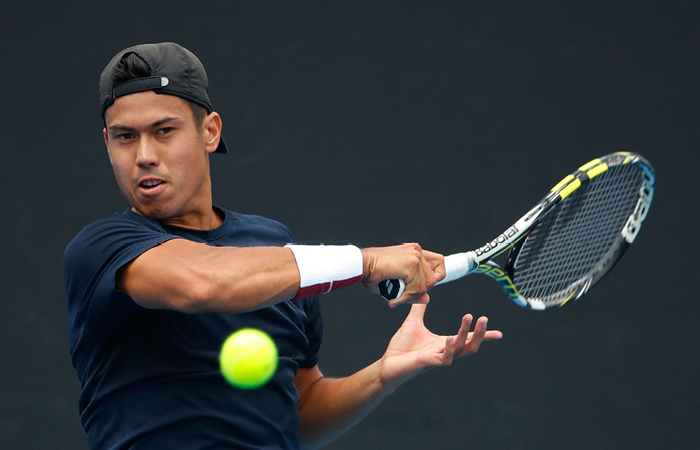Brisbane QLD, Australia, 5 April 2018 | Millie Campbell

The highs and lows of life on the professional tennis circuit are well documented.
You break into the top hundred, doors open. You break into the top ten, you and your family are set for life. But in the highly competitive world between 100 and 200 in the world, it’s as much about the tournaments you choose play as the results themselves. Add prolonged injury to the mix, and staying competitive is an art-form.
Jason Kubler knows better than most the peaks and troughs of professional tennis. At 16, he was the No.1 ranked junior player in the world. By 23, he’d undergone six knee surgeries and had 14 cents to his name. It’s been a long road for the boy from north Brisbane, who’s now comfortably back inside the world’s top 200 after sitting at 1700 this time last year.
Kubler first started tennis when he was five years old. There was a court not 100 meters from his house, and an older brother who was more than happy to use his age to get the upper hand in their after school sets.
One day, Kubler decided to join a Pee Wee coaching session, learned how to hit a forehand, and was hooked.
“I remember I had to hit a forehand and I had to aim my elbow near a light post, and I got it right… the feeling of getting something right was cool.”
His talent and determination obvious, Kubler went on to represent Australia for the first time when he was 12, and by 14, he was competing overseas. It was at this tender age his now infamous knee problems began.
“The first time was a freak accident, I hit not even a wide forehand, and both knees cracked,” said Kubler.
Two months later, his left knee was operated on again after some tissue was left behind the first time around.
But with extensive rehab the determined youngster managed to keep playing, and by 16, Kubler was the best junior player in the world.
“I went on a pretty good run as a junior with all the ITF tournaments, I think I won a tournament in Darwin and then a tournament in Fiji, and then there was a trip in Asia I went to and I ended up winning all of them.
“At the same time we won the Junior Davis Cup so I went from 250 (in the world) to ending the year at 3 in the world.”
After a string of great results as a junior in 2010, Kubler was offered his first wildcard into the Australian Open main draw.
The young Grand Slam debutante, with such a bright future ahead, couldn’t have foreseen the physical torment to come.
Already multiple knee surgeries down, at 21, he tore cartlidge; again, his left knee was failing him.
“That was the longest one, I had to rehab that one for a little more over a year.”
When he was six surgeries deep, Kubler came close to giving the game away. Plenty of times.
But Kubler didn’t quit. He moved to Spain and played exclusively on clay, the sport’s most forgiving surface.
But life was tough for the former world No. 1.
“You go from winning a lot; I was winning a lot, to losing first round maybe three or four weeks in a row.
“It’s tough to get over that, because you think you are going to win all the time.”
It was mid last year, with sore knees and an empty bank account, that Kubler came back to Brisbane and started coaching.
“It was tough,” remembered Kubler “the first few weeks when I was trying to get people, it was the pitts.
“I still remember when I started coaching, and my first ever coaching session I made $70 cash and I’ve come home and like “Mum! Yes! Seventy bucks!” he laughs.
His obsession with earning money began, and in an attempt to make some more, Kubler decided to play the Australian Pro Tour swing. In Brisbane, he lost second round and was happy with that. In Toowoomba, he surprised everyone including himself by making the final.
The next tournament was in Cairns, and after drawing another former junior world No.1 in Luke Saville in the first round, Kubler was sure he’d lose and started looking for flights home. But he won that match, and three more after that, to make his second consecutive Pro Tour final.
“Somehow I started doing well,” said Kubler.
“Which didn’t make any sense, because literally three weeks before I started doing well I was coaching.”
It was the start of a great and unlikely run for the 24 year old, who backed up his success in the Pro Tours by winning a Challenger in Traralgon from qualifying.
Two months later, after an 8 week break from a sore shoulder, Kubler was in his hotel room ahead of a quarterfinal in Playford when he answered a phone call from an unknown number.
It was Lleyton Hewitt.
“I didn’t have his number saved and he was like “Yeah it’s Lleyton”, and I was like “alright here we go.””
It was Hewitt who told Kubler he’d earned his second Australian Open wildcard, eight years after his first. Forced to digest the information while preparing to play, Kubler, as calm as ever, went on to win the Challenger.
A month later at the Australian Open, Kubler drew tenth seed Pablo Carreno-Busta from Spain in the first round.
It was a match that had the fans on the edge of their outside court seats. Despite the massive ranking gap, Kubler had the Spaniard at a set-all and a break up. Channel 7 crossed live to the match, and commentators were hardly unable to hide their surprise at the quality of play and level of calm they were seeing from the Aussie underdog.
But with limited preparation for a five-set battle, and on a hard surface, cramps set in. Kubler lost the match, but left with a shot of confidence and well-earned paycheck.
In good health and inside the top 200, Kubler says he’s not taking anything for granted in 2018. He plans to spend the next 8 months going through qualifying at all the Grand Slams, and anything else is a bonus.
“I don’t think I have any goals, if anything the goal would be to keep trying my best, whatever that means; keep trying my best not to get injured, keep trying my best to have fun when I’m on court. Normally if I have fun I play well and I’m enjoying it all.”
“You can’t really control where your ranking is going to be, and as long as I tried as hard as I could, that’s the main thing.”
Now the eighth ranked Aussie player, anything is possible for the 24 year old who’s proved he only needs a matter of months to exceed everyone’s expectations and then some.

